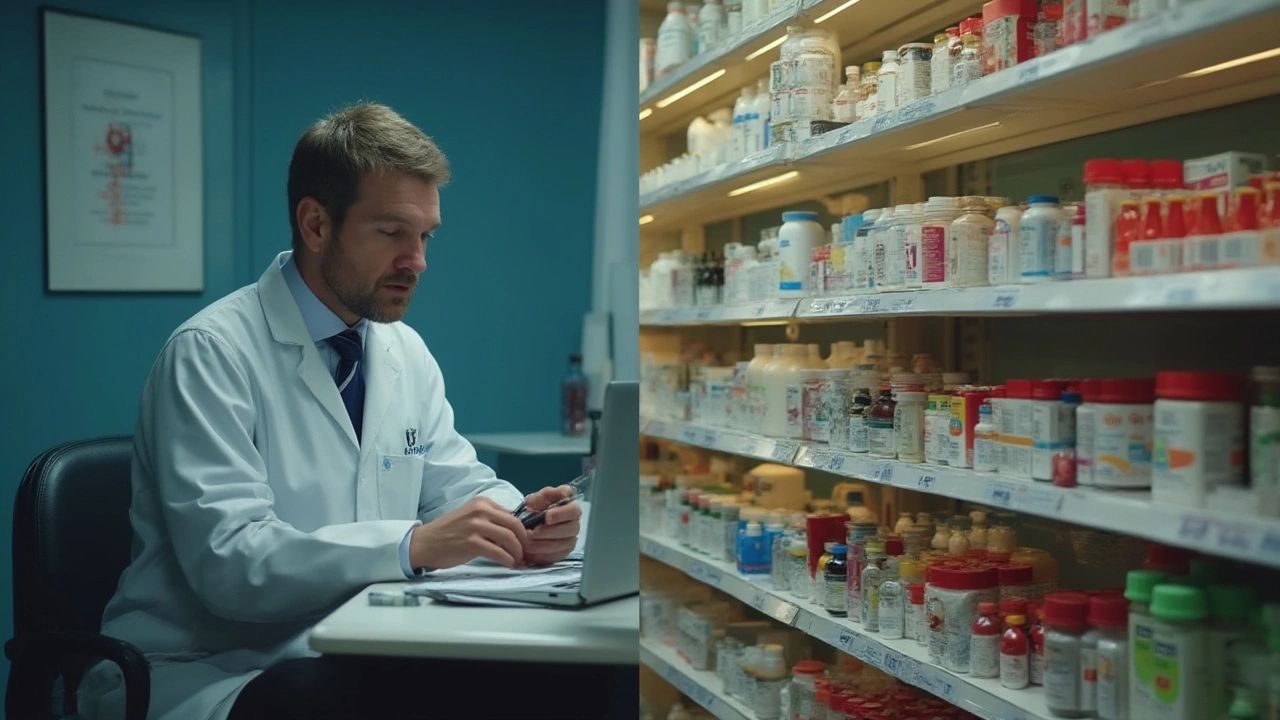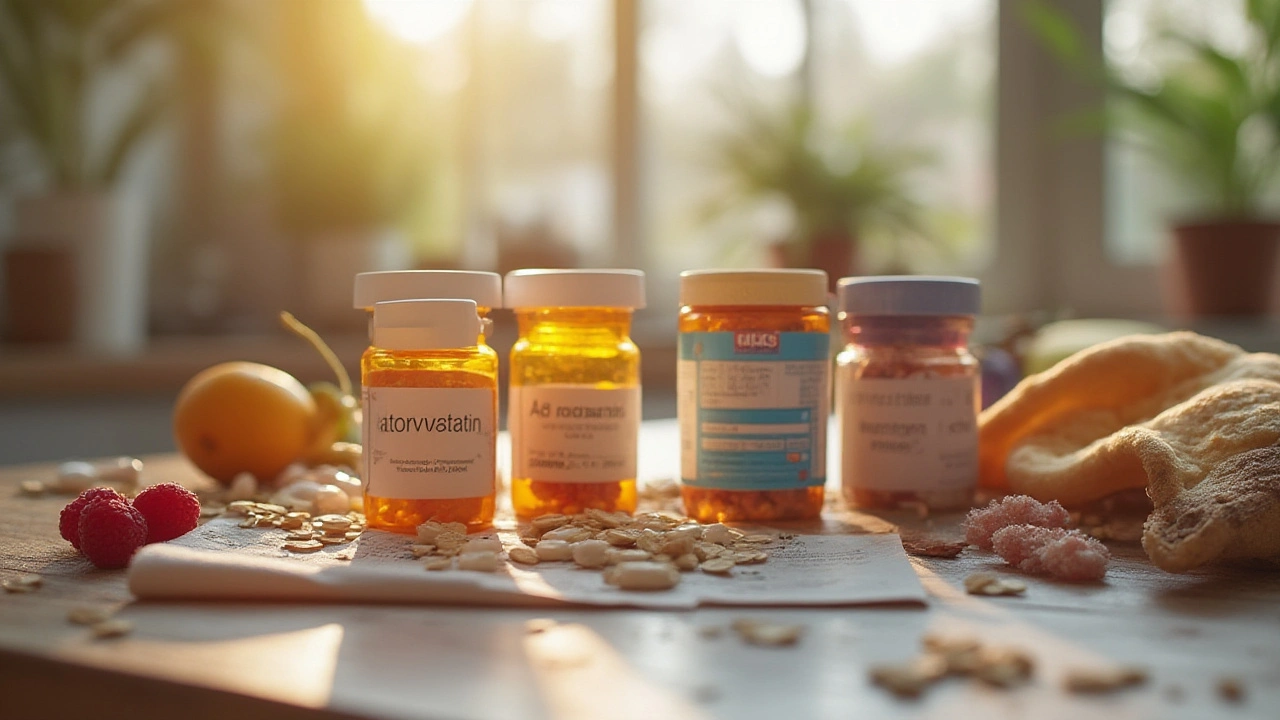Walk into any pharmacy or scan the wellness aisle online, and there it is—yet another bottle claiming to “lower cholesterol naturally.” Flashy text promises the same results as your prescription statin with none of the doctor visits, lab tests, or insurance mess. Tempting, right? With atorvastatin topping prescription charts for years, it's no wonder people are desperate for an easier option. But do these over-the-counter (OTC) alternatives actually work—or is it just marketing wizardry? Let’s pull back the curtain and see what stands up to the science.
The Truth Behind OTC Atorvastatin Substitutes
Atorvastatin isn’t just famous—it’s a blockbuster. We’re talking millions of scripts every year. This statin didn't reach that status by chance; clinical trials have shown, over and over, that it knocks down LDL ("bad") cholesterol and slashes your risk for heart attacks and strokes. Why the rush to leave it behind? For some, it's side effects: muscle aches, liver numbers that won’t behave, or brain fog. Others just prefer not to rely on a prescription they need to refill every month. The promise of an atorvastatin substitute over the counter is irresistible. But let’s pause before tossing prescription bottles.
There’s one glaring difference you can’t ignore: anything truly effective at lowering cholesterol as much as statins will probably be labeled as a drug, not a supplement, and, legally, won’t be sold OTC. The FDA draws a big, bright line here. That’s why those bottles with claims like “supports healthy cholesterol” use clever language—they can’t legally claim to treat high cholesterol. So when you see an OTC product that looks like that, scan the label for these ingredients:
- Red yeast rice – This is actually nature’s statin, containing monacolin K, the very same chemical as lovastatin. Problem is, FDA started cracking down in 2007. Most red yeast rice on shelves today won’t have enough active ingredient to tilt your cholesterol numbers.
- Plant sterols and stanols – These copy what fiber does in your gut, kicking out some of the cholesterol before it’s absorbed. They budge your LDL a bit—think 5–15%. Real statins like atorvastatin drop LDL by up to 50% or more in high doses.
- Niacin (Vitamin B3) – Niacin does lower cholesterol at drug-level doses. But here’s the catch: you need a prescription-level dose for any real effect, and those doses can spark flushing, liver issues, and blood sugar spikes. OTC niacin is usually just a sprinkle.
- Omega-3 fatty acids (Fish oil) – Don’t expect much. Fish oil is a pro at lowering triglycerides, not LDL cholesterol. LDL might nudge up a little on fish oil, in fact.
- Fiber supplements (psyllium husk, beta-glucan) – Bulk up your fiber and LDL can drop by about 5%. Healthy move? Sure. Replacement for a statin? Not even close.
That list looks promising on the surface. But every genuine scientific review says the same thing: no OTC supplement matches what prescribed statins do. The most dramatic statin success stories—like people dropping their LDL numbers by half—just haven’t happened with anything you can buy without a script, and certainly not overnight.
If you’re the type who likes cold, hard data, check out this quick table comparing the LDL reduction you can expect from some real-world options:
| Remedy | Potential LDL Reduction |
|---|---|
| Atorvastatin 20–40mg RX | 35–60% |
| Red Yeast Rice (OTC) | 3–13% (at legal doses) |
| Plant Sterols/Stanols | 5–15% |
| Niacin | 10–20% (at RX doses) |
| Fish Oil | 0–2% (may increase LDL) |
| Fiber Supplements | 5–10% |
So why do these products fly off shelves? It’s hope. And the fact that folks hate side effects. But most people ditch statins without telling their doctor—nobody double-checks if their new chewy supplement actually delivers.
The truth hurts: No legally-sold OTC product in 2025 has matched the power of atorvastatin. If you find a supplement that seems to “work like a statin,” odds are it either has an unregulated (and risky) dose of statin-like ingredient, or the result won’t last. And be honest, Google is filled with wild claims. Stick to the science—but be open to reality checks too.

Digging Deeper: Research, Risks, and Reality Checks
Here’s something a lot of people don’t realize: the supplement industry isn’t policed like prescription drugs. The FDA can pull products only after complaints surface. Most OTC “cholesterol-lowering” pills are classified as food supplements—no testing for purity, actual content, or safety is required before they hit the market. In 2019, ConsumerLab tested dozens of red yeast rice supplements and found some had almost no active compound, and others had dangerous contaminants. That should make anyone pause before swapping their statin for an OTC alternative.
People also mix up “natural” with “safe.” Red yeast rice can hurt your liver just like prescription statins (sometimes more so, because of unmonitored doses and unknown contaminants). Niacin, in high doses, can punch your liver too and worsen diabetes, but the low-dose or time-release OTC bottles you find barely move your cholesterol.
Now, there are some tips to make OTC cholesterol efforts more effective—if you’re smart about it. Always talk with your doctor before making any changes. Get your liver tested before and a few months after starting red yeast rice (if you can find one with real monacolin K—which, legally, you shouldn’t in the US). Use only products from brands that show third-party testing. Don’t mix and match supplements—you could end up with more side effects, weird drug interactions, or wasted cash. And don’t skip bloodwork. Your cholesterol won’t magically behave just because you feel better.
Here’s where it gets tricky: if your cholesterol is just a little up and you have no history of heart disease or diabetes, tweaking your diet and using plant sterols or added fiber might nudge your numbers enough. But once you’re in high-risk territory (think: previous heart attack, diabetes, high BP), every major guideline from Europe to North America says stick to statins for proven risk reduction. Sometimes there’s room for a combo approach: your doctor may add a supplement to a low-dose statin if you’re sensitive. The research here is mixed but interesting.
If you’re looking for fresh, science-backed insights, check out this comprehensive guide on the best atorvastatin substitute over the counter—it reviews what’s real, what works (and what doesn’t), and what’s being hyped right now.
Ever wondered about those wild success stories circulating online? They're often exaggerated or missing key details—like whether the person was also exercising more, losing weight, or secretly went back to their prescription. One 2022 study showed 61% of people using an OTC red yeast rice supplement thought they were getting real benefit. Only 24% saw a statistically measurable drop in cholesterol, and half of those still needed a prescription statin within a year.
That doesn’t mean supplements are useless. Psyllium husk, for instance, is fantastic for digestion and a little cholesterol help—with zero statin-like side effects. Plant sterols are safe and can fit easily in your morning routine if you like smoothies or fortified yogurts. But no smart doctor will tell someone with major risk factors to swap atorvastatin for an OTC product and just hope for the best.
If you are keen to try any non-prescription alternatives, create a tracking habit. Get a baseline cholesterol blood test. Try your chosen supplement for three months (consistently, same brand!). Retest. If you see significant change (say, LDL down by 15% or more), congrats—you’re one of the lucky few whose body responds. If not, don’t give up. Revisit your options, and maybe get comfy with the idea that a small prescription dose plus lifestyle tweaks might just be your winning combo.

Smarter Choices: Building a Realistic Plan for Cholesterol Control
Here’s something that doesn’t get shouted from every rooftop: the single biggest boost to cholesterol you’ll ever get comes from lifestyle tweaks. Statins like atorvastatin are for when heart risk is sky-high or diet alone doesn’t cut it. But plenty of people dodge that script entirely with smart habits. Here’s what actually works (and has proof):
- Eat more soluble fiber. Not just a fiber supplement—think oats, beans, lentils, apples, and pears. A bowl of oatmeal daily can drop LDL by 10% in some studies.
- Swap out saturated fats. Use olive oil in place of butter, eat avocado toast instead of bacon and eggs, choose nuts over chips.
- Move your body daily. Even brisk walking for 30 minutes most days makes a bigger dent than you might think, especially combined with fiber and better fats.
- Stop smoking (or vaping). Instantly drops your heart risk, and can boost your HDL (the "good" cholesterol) too.
- Cut excess sugar and processed foods. Cholesterol is only half the battle—high blood sugar and inflammation are the other enemy.
Curiosity pays off. Explore non-prescription approaches, but go in with eyes wide open. That OTC bottle on the shelf? Check for third-party verification like USP or NSF. Scan labels for actual ingredient amounts—if it doesn’t list how many milligrams, be suspicious. Watch out for wild, unproven claims—or promises that sound too good to be true (they probably are).
Another insider trick: pharmacy staff can be incredibly helpful. They know the brands people buy again and again (because they work or at least don’t upset people’s stomachs). If in doubt, ask. Doctors, too, are way more open now to discussing supplements—no need to hide your curiosity. Just be honest if you’re considering dropping your prescription.
Cholesterol numbers can be stubborn. Some people do everything “right” and still end up on atorvastatin. That’s not a moral failure—it’s genetics. If parents or grandparents were on heart meds, your risk probably started years before your first bacon cheeseburger. Go easier on yourself.
There are no magic shortcuts in the OTC supplement aisle. But with honesty, curiosity, and a dash of skepticism, you can build a plan that fits your body and your peace of mind. Whether you stick with your prescription, tweak your lifestyle, or cautiously try an OTC option, keep your doctor in the loop and track what really happens. Your heart deserves nothing less.





Ezequiel adrian
July 30, 2025 AT 14:27Bro this post is fire 🔥 I saw a guy on TikTok take red yeast rice and dropped 40 points in LDL in 2 weeks. Probably fake but still… I’m tempted. 🤷♂️
Rachel Whip
July 31, 2025 AT 01:12Red yeast rice isn't magic-it's just unregulated lovastatin. If it works, it's because it's doing the same thing as a statin. The FDA cracked down for a reason. Don't risk liver damage because you hate doctors.
Plant sterols? Fine. Useful. But don't confuse them with treatment. They're like brushing your teeth instead of getting a root canal.
Amanda Wong
August 1, 2025 AT 07:28Oh please. The real conspiracy is that Big Pharma pays off the FDA to keep you hooked on statins. People have lowered cholesterol with turmeric, garlic, and cold showers for centuries. Modern medicine just wants you dependent. 🤡
Cynthia Springer
August 1, 2025 AT 20:19I tried the plant sterol margarine for three months. My LDL dropped 8%. Not bad, but I still had to take a low-dose statin because my triglycerides were climbing. It’s not either/or-it’s both.
I also started eating oatmeal every morning. I didn’t lose weight, but my digestion improved and my cholesterol stabilized. Maybe it’s not about finding the ‘magic pill’ but stacking small wins.
Joe bailey
August 3, 2025 AT 12:51Love this breakdown. Seriously. So many people think ‘natural’ = ‘safe’ and that’s dangerous. I had a cousin who took red yeast rice, ended up with rhabdo, and spent a week in the hospital. He didn’t even tell his doctor.
Just because something’s on a shelf doesn’t mean it’s not a drug. And if it works like a statin? It probably is one.
Also-fiber. Just eat more beans. It’s boring but it works. 🙌
JAY OKE
August 4, 2025 AT 00:55My grandma took fish oil for 10 years. Her cholesterol never changed. But she swore she felt ‘lighter.’ Maybe it’s placebo. Maybe it’s the omega-3s helping her joints. Doesn’t matter. She’s 89 and still gardening. That’s the real win.
Don’t fix what ain’t broke. If your doctor says you’re fine, chill.
Kaushik Das
August 5, 2025 AT 09:28Back home in India, we’ve always used fenugreek seeds soaked overnight. Some studies show it lowers LDL by 10–15%. Not as good as atorvastatin, but no side effects. And it tastes like maple syrup. I mix it in my morning smoothie.
Also, walking 8k steps a day in Delhi heat? That’s free cardio. No supplement needed.
Western medicine loves pills. We’ve got spices and sweat. Both work. Why not both?
mohit passi
August 5, 2025 AT 13:26Statins are not evil. Supplements are not magic. Life is messy. 🌱
My LDL was 190. I added psyllium, ate more greens, walked daily, and took 1000mg niacin (gradually). After 6 months, it dropped to 135. Not perfect. But I didn’t need a statin.
Doctors hate when you DIY. But sometimes, you gotta listen to your body-not just the chart.
Also, I’m a data nerd. I tracked everything. Spreadsheet. Charts. Mood. Sleep. It’s not just cholesterol. It’s your whole system.
Aaron Whong
August 7, 2025 AT 03:50There’s an epistemological dissonance here. The biomedical paradigm privileges pharmacological intervention as the sole valid modality of lipid regulation, while dismissing holistic epistemes as ‘anecdotal.’
But what if the reductionist model fails to account for systemic bioindividuality? The placebo effect isn’t noise-it’s data. And the pharmaceutical industrial complex has a vested interest in maintaining the statin hegemony.
Just saying.
Deborah Williams
August 7, 2025 AT 07:44So we’re supposed to trust a $30 bottle from Walmart over decades of clinical trials? That’s not skepticism. That’s cultural nihilism.
Meanwhile, people in Japan eat fish, walk everywhere, and live to 100. No statins. No supplements. Just… life. Maybe the real ‘alternative’ is not buying into the supplement industrial complex at all.
Also, if you need a pill to feel healthy, maybe you’re already too far gone.
james thomas
August 7, 2025 AT 13:42Everyone’s scared of statins because they don’t understand them. Muscle pain? That’s just your body detoxing. Liver numbers? They go up and down. Your doctor doesn’t know what they’re doing anyway.
I took red yeast rice for a year. My cholesterol dropped 50%. I didn’t need a prescription. I’m living proof.
Also the FDA is corrupt. They banned it because Big Pharma paid them. Trust me I read it on Reddit
Asia Roveda
August 7, 2025 AT 14:31Why do Americans think they can outsmart biology with a $12 bottle from GNC? In Europe, they don’t even sell red yeast rice. Because they know it’s dangerous.
You want natural? Eat like your ancestors. Not like a supplement influencer.
Also-your ‘natural’ cholesterol fix probably has heavy metals. I’ve seen the lab reports. You’re just poisoning yourself slowly.
Micaela Yarman
August 8, 2025 AT 16:53It is imperative to underscore the regulatory distinction between pharmaceutical agents and dietary supplements. The latter are not subject to pre-market approval by the Food and Drug Administration, thereby rendering their efficacy and safety profiles inherently unreliable.
Furthermore, the conflation of ‘natural’ with ‘therapeutic’ constitutes a fallacious appeal to nature-a logical error that has resulted in widespread public health misinformation.
One must exercise extreme caution when considering the substitution of evidence-based pharmacotherapy with unregulated botanical extracts.
Ali Miller
August 8, 2025 AT 22:52Okay but what about the Chinese herbal formula they use in Beijing hospitals? I saw a video. It’s a blend of 17 herbs. They got LDL down 60% without statins. Why isn’t this on the news?
Because the West doesn’t want you to know. They want you hooked on pills. #StatinsAreABusiness
Also I heard the FDA banned red yeast rice because it’s too effective. That’s not science. That’s capitalism.
Stephen Adeyanju
August 10, 2025 AT 07:42My doctor told me to take atorvastatin I said no I took garlic pills and now I’m fine
no bloodwork no nothing
just vibes
trust the process
also i bought a crystal that helps with cholesterol its called citrine
it glows when i’m healthy